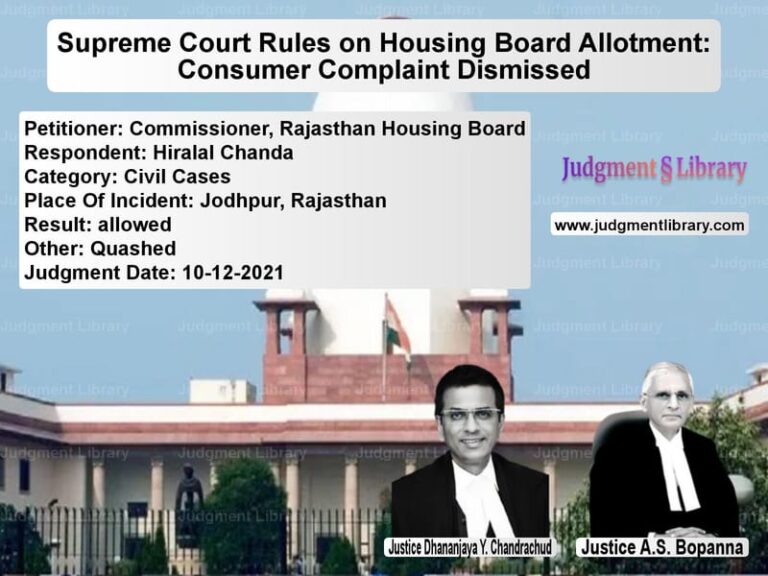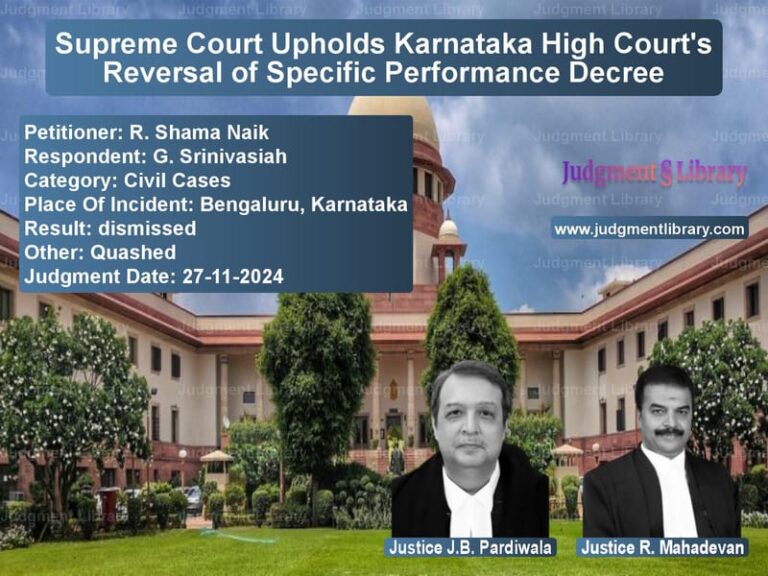Understanding Mortgage by Conditional Sale: A Landmark Judgment
The case of Bibi Fatima & Ors. v. M. Ahamed Hussain & Ors. revolved around a dispute concerning the redemption of a mortgage and re-conveyance of property. The core issue was whether the transaction in question was a mortgage by conditional sale or an outright sale with a repurchase condition. This case touched upon important legal principles that govern property transactions, particularly the nuances between mortgage by conditional sale and sale with a repurchase condition under the Transfer of Property Act, 1882.
The plaintiff’s father, Ummar Saheb, had obtained a loan from Vijaya Bank and, having defaulted on repayment, was subject to legal action, resulting in a decree for repayment. To settle the loan and other family debts, Ummar Saheb transferred the property to the first defendant, his son-in-law, for Rs. 5,900. The question arose as to whether this document executed on 02.07.1964 was an outright sale or a mortgage by conditional sale. This judgment examines the criteria and the surrounding facts to resolve the dispute.
Background of the Case
The events leading up to this case began when Ummar Saheb defaulted on a loan he took from Vijaya Bank, leading to the bank’s legal actions. As part of the execution of the decree, the bank brought Ummar Saheb’s property to sale. In this dire situation, Ummar Saheb approached the first defendant to raise money to settle his debts. In return, a document was executed in which Ummar Saheb transferred the property to the first defendant for Rs. 5,900. This transaction was crucial as the property, valued above Rs. 10,000, was transferred to the first defendant on the condition that if the amount of Rs. 5,900 was repaid within a period of 2-5 years, the property would be re-transferred to Ummar Saheb. This transaction sparked the legal dispute at the heart of the present case.
After the death of Ummar Saheb in 1978, the plaintiff, who was his legal heir, approached the first defendant seeking the re-conveyance of the property. However, the first defendant refused, leading to the plaintiff filing a suit for redemption of the mortgage and re-conveyance of the property. The plaintiff’s case was that the document executed by Ummar Saheb was a mortgage by conditional sale, while the first defendant argued that the transaction was a sale deed with a condition of repurchase.
The Legal Dispute
The crux of the case lay in interpreting the nature of the transaction. The plaintiff argued that the document executed on 02.07.1964 was a mortgage by conditional sale governed by Section 58(c) of the Transfer of Property Act. The plaintiff relied heavily on the fact that the amount paid by the first defendant was essentially a loan to clear the debts, with the condition of re-conveyance on repayment. The plaintiff also argued that the property was worth far more than Rs. 5,900, further reinforcing the claim that this was a mortgage, not a sale.
On the other hand, the first defendant contended that the transaction was a genuine sale with a condition of repurchase. The first defendant’s argument rested on the claim that the property was sold outright to clear the debts, and that the terms of repurchase were merely a contractual agreement without affecting the nature of the sale. Additionally, the first defendant suggested that Ummar Saheb continued to reside on the property as a tenant, relying on a Badige Karar (rental agreement) executed by Ummar Saheb, though this document was disputed during the trial.
Arguments of the Petitioner
- The petitioner argued that the document was a mortgage by conditional sale, citing the nature of the agreement and the specific condition that the property would be re-transferred on repayment of the loan amount.
- The petitioner highlighted that the sum of Rs. 5,900 was precisely the amount required to settle the debts, indicating that the intention was to raise a loan, not to complete a sale.
- It was further argued that the fact that Ummar Saheb remained in possession of the property until his death supported the case for mortgage rather than sale, as such possession is typically indicative of a mortgage relationship.
- The plaintiff also pointed to the legal provision under Section 58(c) of the Transfer of Property Act, which defines a mortgage by conditional sale.
Arguments of the Respondent
- The first defendant maintained that the transaction was an outright sale with a condition for repurchase, citing the language of the document and the absence of any provision indicating a mortgage.
- He argued that the amount of Rs. 5,900 represented the market value of the property at the time and was paid in exchange for the transfer of ownership, not as a loan.
- The respondent also claimed that the arrangement for re-transfer was simply a repurchase option, typical in certain property transactions, rather than the formation of a mortgage.
- Furthermore, the first defendant insisted that the rental agreement executed later on, where Ummar Saheb continued to reside on the property, solidified his view that this was a sale with a tenancy agreement, not a mortgage.
Key Judicial Reasoning
The Supreme Court of India, after carefully reviewing the case, emphasized the importance of interpreting the document in question to determine its true nature. The Court noted that the intention of the parties must be ascertained from the language used in the document. If the words of the document are clear and unambiguous, their plain meaning should be given effect. However, where ambiguity exists, the surrounding circumstances and the relationship between the parties must be considered to determine the intent.
The Court further referred to the principle outlined in the case of Pandit Chunchun Jha v. Sheikh Ebadat Ali, (1955) 1 SCR 174, stating that where there is ambiguity in the language of the document, extrinsic evidence can be used to clarify the intent of the parties. The Court observed that the mere presence of a condition for repurchase does not automatically make the transaction a mortgage, as this condition can also be a feature of an outright sale with a repurchase option.
Analysis of the Evidence
Upon reviewing the evidence, the Court found that the sum of Rs. 5,900 was the exact amount needed to clear Ummar Saheb’s debts, further suggesting that the transaction was more akin to a loan arrangement. Additionally, the fact that Ummar Saheb remained in possession of the property until his death and that no mutation of the property was done in favor of the first defendant during this time supported the petitioner’s argument that the transaction was a mortgage by conditional sale.
The Court also took note of the absence of any clear indication in the deed that the sale would become absolute after the five-year period. Moreover, the Court found that the relationship between the parties was one of debtor and creditor, as evidenced by the condition of re-conveyance upon repayment, which aligned with the characteristics of a mortgage under Section 58(c) of the Transfer of Property Act.
The Court’s Conclusion
The Supreme Court, after considering all the arguments and evidence, concluded that the document executed on 02.07.1964 was indeed a mortgage by conditional sale. The Court upheld the judgment of the High Court and dismissed the appeal, reinforcing the legal principles surrounding mortgages by conditional sale and clarifying the criteria for distinguishing between a sale and a mortgage in such cases.
The Court’s decision has important implications for property law, particularly in cases where the distinction between a sale and a mortgage is unclear. It reinforces the need for careful scrutiny of the language in property documents and the necessity of considering the surrounding circumstances to understand the true nature of the transaction.
Don’t miss out on the full details! Download the complete judgment in PDF format below and gain valuable insights instantly!
Download Judgment: Bibi Fatima & Ors. vs M. Ahamed Hussain & Supreme Court of India Judgment Dated 01-08-2017.pdf
Direct Downlaod Judgment: Direct downlaod this Judgment
See all petitions in Property Disputes
See all petitions in Contract Disputes
See all petitions in Specific Performance
See all petitions in Judgment by L. Nageswara Rao
See all petitions in Judgment by Navin Sinha
See all petitions in dismissed
See all petitions in supreme court of India judgments August 2017
See all petitions in 2017 judgments
See all posts in Civil Cases Category
See all allowed petitions in Civil Cases Category
See all Dismissed petitions in Civil Cases Category
See all partially allowed petitions in Civil Cases Category







